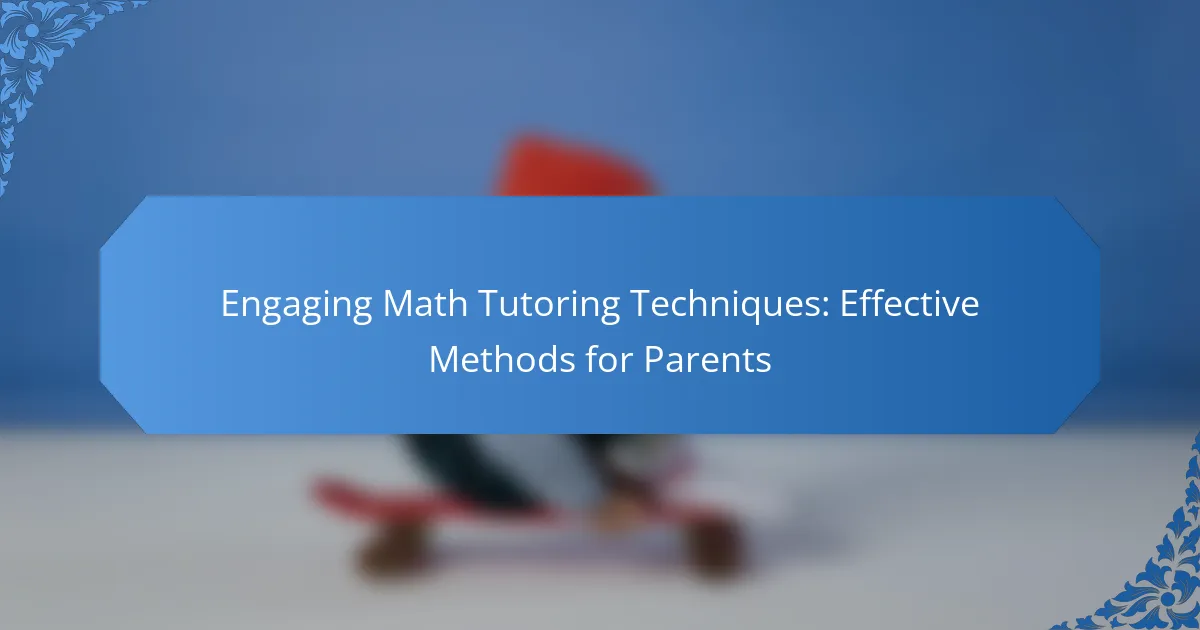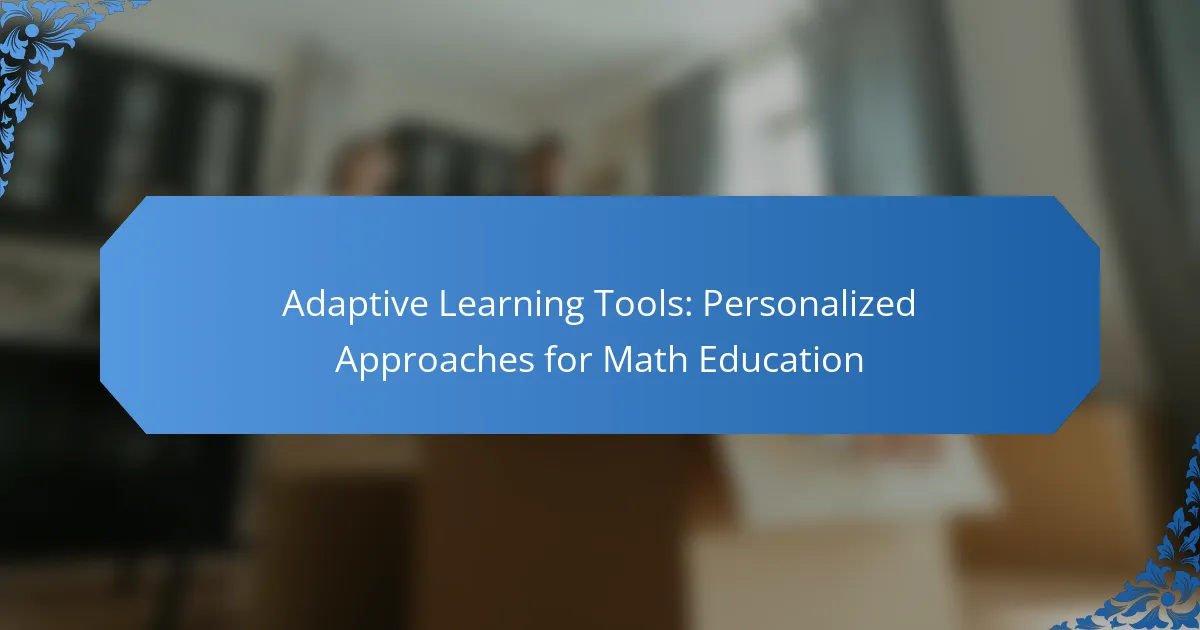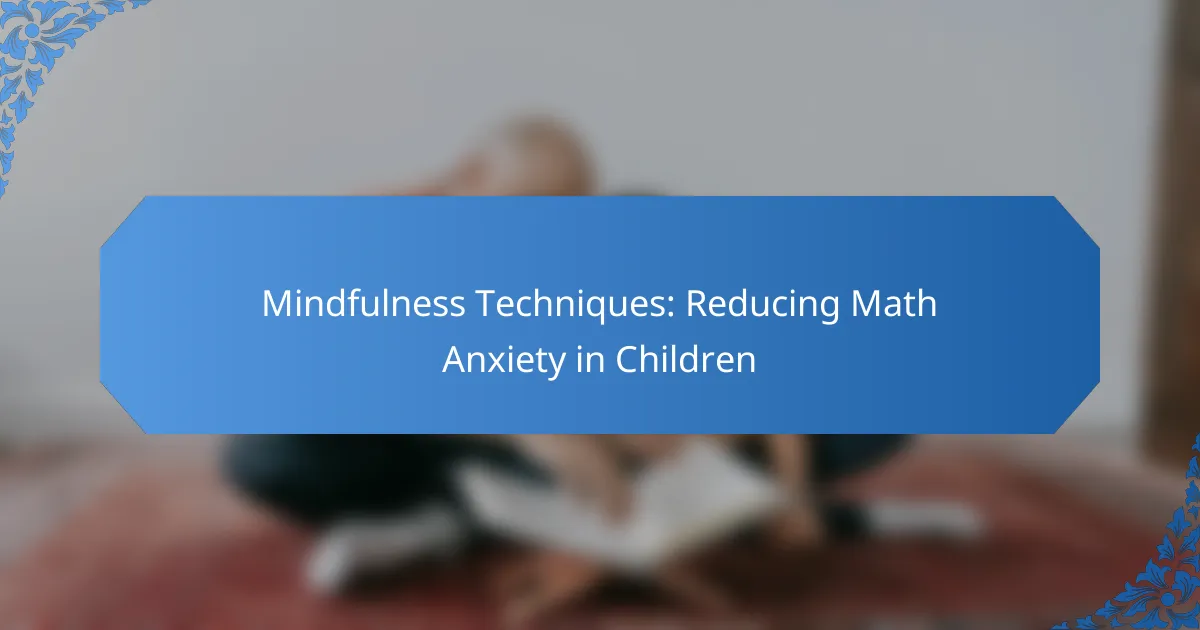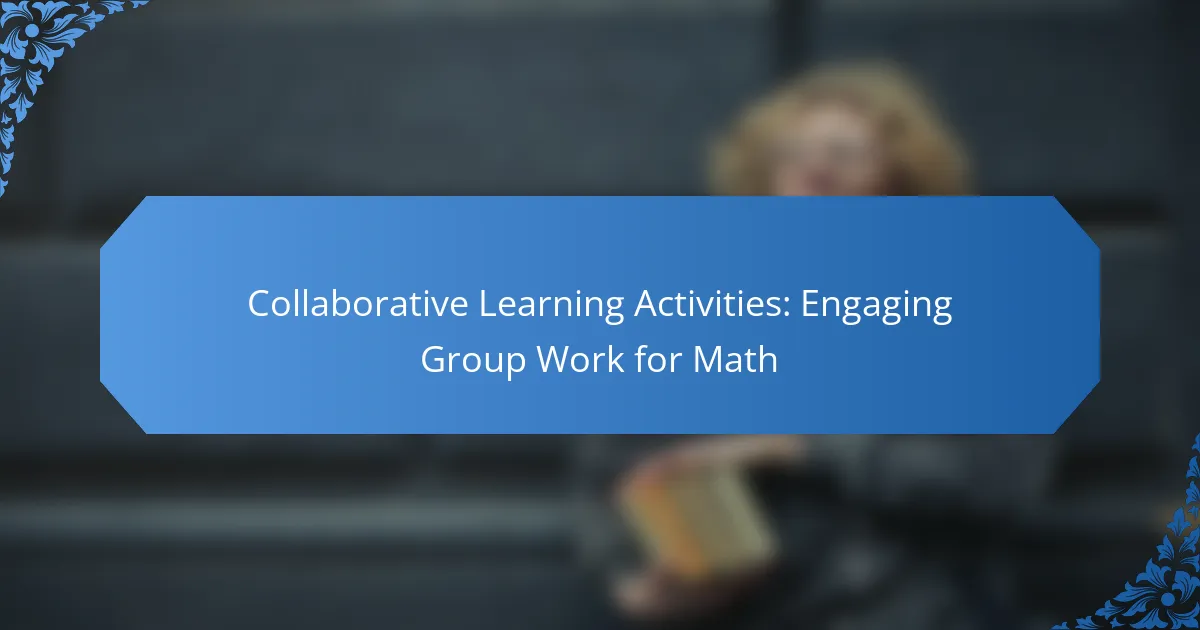Engaging math tutoring techniques for parents can transform the way children understand and retain mathematical concepts. By incorporating interactive tools, real-world applications, and personalized strategies, parents can create a supportive learning environment that enhances their child’s problem-solving skills and fosters a positive attitude towards math.

What Are Effective Math Tutoring Techniques for Parents?
Effective math tutoring techniques for parents involve engaging methods that enhance understanding and retention of mathematical concepts. Utilizing a mix of interactive tools, real-world applications, and personalized strategies can significantly improve a child’s math skills.
Interactive Learning Tools
Interactive learning tools, such as educational apps and online platforms, can make math more engaging for children. These tools often include visual aids, simulations, and quizzes that cater to different learning styles.
Consider using resources like Khan Academy or Prodigy Math, which provide personalized learning experiences. These platforms can track progress and adapt to a child’s pace, ensuring they grasp each concept before moving on.
Real-World Applications
Applying math to real-world situations helps children understand its relevance and utility. Parents can incorporate math into daily activities, such as cooking, budgeting, or shopping, to demonstrate practical uses of mathematical concepts.
For example, ask your child to calculate the total cost while grocery shopping or to adjust a recipe based on serving sizes. This approach not only reinforces math skills but also builds confidence in their abilities.
Personalized Learning Plans
Creating personalized learning plans allows parents to tailor tutoring sessions to their child’s unique needs and strengths. Assess your child’s current math skills and identify areas for improvement to develop a focused plan.
Set specific, achievable goals and regularly review progress. Adjust the plan as needed to keep your child motivated and challenged, ensuring they remain engaged in their learning journey.
Gamification Strategies
Gamification involves incorporating game-like elements into math learning to make it more enjoyable. This can include using point systems, rewards, or challenges to motivate children to practice math skills.
For instance, create a math challenge where your child earns points for completing problems correctly or competing against a timer. This approach can transform routine practice into an exciting activity, encouraging consistent engagement.
Regular Progress Assessments
Conducting regular progress assessments helps parents gauge their child’s understanding and identify areas that may need further attention. These assessments can be informal, such as quizzes or discussions about recent lessons.
Consider setting aside time each week to review what your child has learned and discuss any difficulties they may be facing. This ongoing feedback loop can help reinforce learning and build a supportive environment for improvement.

How Can Parents Implement These Techniques?
Parents can implement effective math tutoring techniques by creating a supportive learning environment, setting clear objectives, and leveraging online resources. These strategies help children engage with math concepts and improve their problem-solving skills.
Creating a Structured Study Environment
A structured study environment is essential for effective learning. Designate a quiet, well-lit space free from distractions where your child can focus on math tasks. Ensure that all necessary materials, such as textbooks, notebooks, and calculators, are readily available.
Establish a consistent study schedule that aligns with your child’s daily routine. For example, setting aside 30-60 minutes each day for math practice can help reinforce concepts and build confidence. Use timers to create a sense of urgency and maintain focus during study sessions.
Setting Clear Goals and Expectations
Setting clear goals and expectations helps children understand what they need to achieve. Start by discussing specific math topics or skills that require improvement, such as fractions or problem-solving techniques. Break these down into smaller, manageable goals.
Encourage your child to set personal targets, such as completing a certain number of practice problems each week. Regularly review progress together to celebrate achievements and adjust goals as needed. This approach fosters accountability and motivation.
Utilizing Online Resources
Online resources can enhance math tutoring by providing interactive learning experiences. Websites and apps like Khan Academy or IXL offer practice exercises and instructional videos tailored to various skill levels. These platforms often track progress, allowing parents to monitor their child’s development.
Consider incorporating online math games that make learning fun while reinforcing key concepts. Look for resources that align with your child’s curriculum to ensure relevance. However, balance screen time with traditional study methods to maintain a well-rounded approach to learning.

What Are the Benefits of Engaging Math Tutoring?
Engaging math tutoring offers numerous advantages, including improved understanding of mathematical concepts and enhanced academic performance. These benefits not only help students excel in math but also foster a positive attitude towards learning.
Improved Student Confidence
One of the primary benefits of engaging math tutoring is the boost in student confidence. When students receive personalized attention and tailored instruction, they often feel more capable of tackling challenging problems. This newfound confidence can lead to a more positive approach to math and other subjects.
To foster confidence, tutors can use positive reinforcement and celebrate small victories. For example, acknowledging a student’s progress in solving equations can motivate them to take on more complex challenges.
Enhanced Problem-Solving Skills
Engaging math tutoring significantly enhances problem-solving skills by encouraging students to think critically and approach problems from different angles. Tutors can introduce various strategies, such as breaking down complex problems into manageable steps or using visual aids to illustrate concepts.
For instance, a tutor might guide a student through a multi-step word problem, helping them identify key information and develop a systematic approach. This practice not only improves their current skills but also prepares them for future mathematical challenges.
Increased Motivation to Learn
Engaging math tutoring can greatly increase a student’s motivation to learn. When students see tangible improvements in their skills and receive encouragement from their tutors, they are more likely to develop a genuine interest in mathematics. This motivation can extend beyond math to other subjects as well.
To maintain motivation, tutors should set achievable goals and provide regular feedback. For example, establishing a reward system for completing assignments or mastering specific topics can keep students engaged and eager to learn more.

What Criteria Should Parents Consider When Choosing a Math Tutor?
Parents should consider qualifications, teaching style compatibility, and availability when choosing a math tutor. These factors ensure that the tutor can effectively meet the child’s learning needs and schedule.
Qualifications and Experience
When evaluating a math tutor, check their educational background and teaching experience. A tutor with a degree in mathematics or education, along with several years of tutoring experience, is often more effective.
Additionally, look for any specialized training or certifications in teaching math. This can indicate a deeper understanding of pedagogical techniques that can benefit your child.
Teaching Style Compatibility
Each child learns differently, so it’s crucial to find a tutor whose teaching style matches your child’s learning preferences. Some tutors may focus on problem-solving and practical applications, while others might emphasize theoretical concepts.
Consider arranging a trial session to observe how the tutor interacts with your child. This can help determine if the tutor’s approach fosters engagement and understanding.
Availability and Flexibility
Availability is a key factor when selecting a math tutor. Ensure that the tutor’s schedule aligns with your child’s availability, whether it’s after school, weekends, or during holidays.
Flexibility in rescheduling sessions can also be beneficial, especially if your child has extracurricular activities. Discuss potential scheduling conflicts upfront to avoid issues later on.

What Are Common Challenges in Math Tutoring?
Common challenges in math tutoring include student disengagement, varying learning paces, and difficulty in grasping abstract concepts. Addressing these issues effectively can lead to improved understanding and performance in mathematics.
Lack of Student Engagement
Lack of student engagement is a significant barrier in math tutoring, often resulting in poor retention of concepts and low motivation. When students do not find the material interesting or relevant, they are less likely to participate actively in their learning process.
To combat disengagement, tutors can incorporate interactive activities such as games, real-world problem-solving, and technology-based tools. For instance, using math-related apps or online platforms can make learning more dynamic and enjoyable.
Additionally, connecting math concepts to students’ interests or everyday life can enhance relevance. For example, discussing budgeting or sports statistics can make abstract ideas more tangible and relatable, fostering a deeper connection to the subject.



